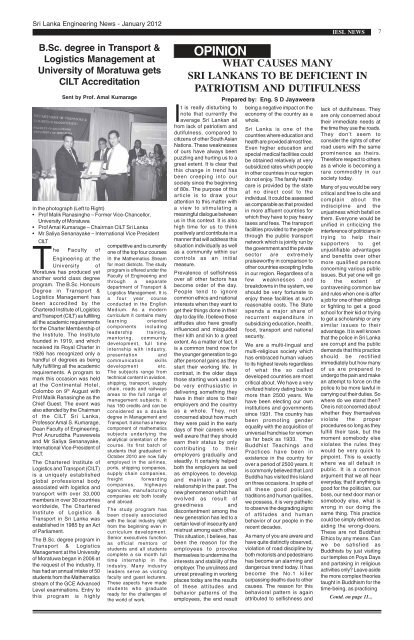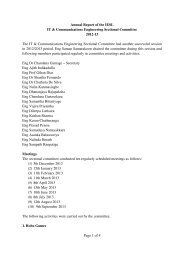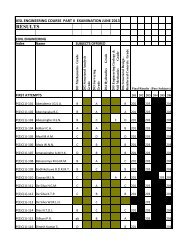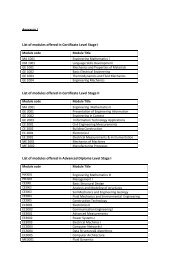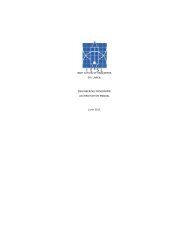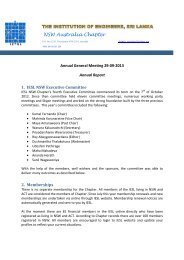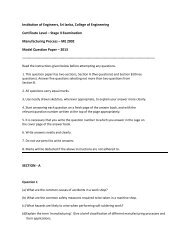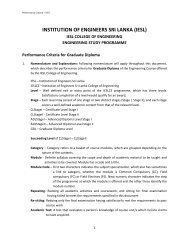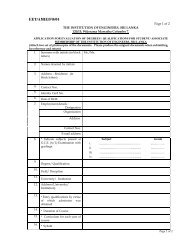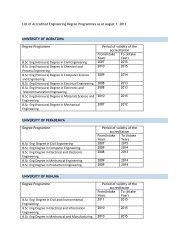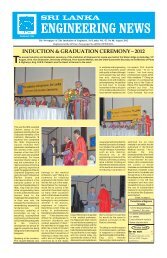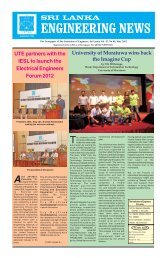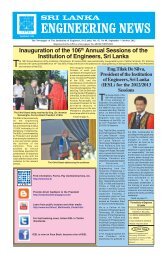Download - IESL
Download - IESL
Download - IESL
You also want an ePaper? Increase the reach of your titles
YUMPU automatically turns print PDFs into web optimized ePapers that Google loves.
Sri Lanka Engineering News - January 2012<br />
B.Sc. degree in Transport &<br />
Logistics Management at<br />
University of Moratuwa gets<br />
CILT Accreditation<br />
Sent by Prof. Amal Kumarage<br />
The Faculty of<br />
Engineering at the<br />
University of<br />
Moratuwa has produced yet<br />
another world class degree<br />
program. The B.Sc. Honours<br />
Degree in Transport &<br />
Logistics Management has<br />
been accredited by the<br />
Chartered Institute of Logistics<br />
and Transport (CILT) as fulfilling<br />
all the academic requirements<br />
for the Charter Membership of<br />
the Institute. The Institute<br />
founded in 1919, and which<br />
received its Royal Charter in<br />
1926 has recognized only a<br />
handful of degrees as being<br />
fully fulfilling all the academic<br />
requirements. A program to<br />
mark this occasion was held<br />
at the Continental Hotel,<br />
Colombo on 9th In the photograph (Left to Right)<br />
Prof Malik Ranasinghe – Former Vice-Chancellor,<br />
University of Moratuwa<br />
Prof Amal Kumarage – Chairman CILT Sri Lanka<br />
Mr Saliya Senanayake – International Vice President<br />
CILT<br />
competitive and is currently<br />
one of the top four courses<br />
in the Mathematics Stream<br />
for most districts. The study<br />
program is offered under the<br />
Faculty of Engineering and<br />
through a separate<br />
department of Transport &<br />
Logistics Management. It is<br />
a four year course<br />
conducted in the English<br />
Medium. As a modern<br />
curriculum it contains many<br />
learning oriented<br />
components including<br />
leadership training,<br />
mentoring, community<br />
development, full time<br />
internship with industry,<br />
presentation and<br />
communication skills<br />
development etc.<br />
The subjects range from<br />
technical content in aviation,<br />
August with<br />
Prof Malik Ranasinghe as the<br />
Chief Guest. The event was<br />
also attended by the Chairman<br />
of the CILT Sri Lanka,<br />
shipping, transport, supply<br />
chain, roads and railways<br />
areas to the full range of<br />
management subjects. It<br />
has 150 credits and can be<br />
considered as a double<br />
degree in Management and<br />
Professor Amal S. Kumarage, Transport. It also has a heavy<br />
Dean Faculty of Engineering, component of mathematics<br />
Prof Anuruddha Puswewela subjects underlying the<br />
and Mr Saliya Senanayake,<br />
International Vice-President of<br />
CILT.<br />
analytical orientation of the<br />
course. Its first batch of<br />
students that graduated in<br />
October 2010 are now fully<br />
The Chartered Institute of employed in the airlines,<br />
Logistics and Transport (CILT) ports, shipping companies,<br />
is a uniquely established<br />
global professional body<br />
associated with logistics and<br />
transport with over 33,000<br />
members in over 30 countries<br />
worldwide, The Chartered<br />
Institute of Logistics &<br />
Transport in Sri Lanka was<br />
established in 1985 by an Act<br />
of Parliament.<br />
supply chain companies,<br />
freight forwarding<br />
companies, highways<br />
agencies, manufacturing<br />
companies etc both locally<br />
and abroad.<br />
The study program has<br />
been closely associated<br />
with the local industry right<br />
from the beginning even in<br />
curriculum development.<br />
The B.Sc. degree program in<br />
Transport & Logistics<br />
Management at the University<br />
of Moratuwa began in 2006 at<br />
the request of the industry. It<br />
Senior executives function<br />
as official mentors of<br />
students and all students<br />
complete a six month full<br />
time internship in the<br />
industry. Many industry<br />
has had an annual intake of 50 leaders serve as visiting<br />
students from the Mathematics faculty and guest lecturers.<br />
stream of the GCE Advanced These aspects have made<br />
Level examinations. Entry to<br />
this program is highly<br />
students who graduate<br />
ready for the challenges of<br />
the world of work.<br />
OPINION<br />
<strong>IESL</strong> NEWS<br />
WHAT CAUSES MANY<br />
SRI LANKANS TO BE DEFICIENT IN<br />
PATRIOTISM AND DUTIFULNESS<br />
It is really disturbing to<br />
note that currently the<br />
average Sri Lankan ail<br />
from lack of patriotism and<br />
dutifulness, compared to<br />
citizens of other South Asian<br />
Nations. These weaknesses<br />
of ours have always been<br />
puzzling and hurting us to a<br />
great extent. It is clear that<br />
this change in trend has<br />
been creeping into our<br />
society since the beginning<br />
of 80s. The purpose of this<br />
article is to draw your<br />
attention to this matter with<br />
a view to stimulating a<br />
meaningful dialogue between<br />
us in this context. It is also<br />
high time for us to think<br />
positively and contribute in a<br />
manner that will address this<br />
situation individually as well<br />
as a community within our<br />
controls as an initial<br />
measure.<br />
Prevalence of selfishness<br />
over all other factors has<br />
become order of the day.<br />
People tend to ignore<br />
common ethics and national<br />
interests when they want to<br />
get their things done in their<br />
day to day life. I believe these<br />
attitudes also have greatly<br />
influenced and misguided<br />
their kith and kin to a great<br />
extent. As a matter of fact, it<br />
is a common trend now for<br />
the younger generation to go<br />
after personal gains as they<br />
start their working life. In<br />
contrast, in the older days<br />
those starting work used to<br />
be very enthusiastic in<br />
delivering something they<br />
have in their store to their<br />
employers and the country<br />
as a whole. They, not<br />
concerned about how much<br />
they were paid in the early<br />
days of their careers were<br />
well aware that they should<br />
earn their status by only<br />
contributing to their<br />
employers gradually and<br />
steadily. It certainly helped<br />
both the employers as well<br />
as employees to develop<br />
and maintain a good<br />
relationship in the past. The<br />
new phenomenon which has<br />
evolved as result of<br />
greediness and<br />
discontentment among the<br />
new generation has led to a<br />
certain level of insecurity and<br />
mistrust among each other.<br />
This situation, I believe, has<br />
been the reason for the<br />
employees to provoke<br />
themselves to undermine the<br />
interests and stability of the<br />
employer. The unruliness and<br />
unrest prevailing in working<br />
places today are the results<br />
of these attitudes and<br />
behavior patterns of the<br />
employees, the end result<br />
Prepared by: Eng. S D Jayaweera<br />
being a negative impact on the<br />
economy of the country as a<br />
whole.<br />
Sri Lanka is one of the<br />
countries where education and<br />
health are provided almost free.<br />
Even higher education and<br />
special medical facilities could<br />
be obtained relatively at very<br />
subsidized rates which people<br />
in other countries in our region<br />
do not enjoy. The family health<br />
care is provided by the state<br />
at no direct cost to the<br />
individual. It could be assessed<br />
as comparable as that provided<br />
in more affluent countries for<br />
which they have to pay heavy<br />
taxes and fees. The transport<br />
facilities provided to the people<br />
through the public transport<br />
network which is jointly run by<br />
the government and the private<br />
sector are extremely<br />
praiseworthy in comparison to<br />
other countries excepting India<br />
in our region. Regardless of a<br />
few weaknesses and<br />
breakdowns in the system, we<br />
should be very fortunate to<br />
enjoy these facilities at such<br />
reasonable costs. The State<br />
spends a major share of<br />
recurrent expenditure in<br />
subsidizing education, health,<br />
food, transport and national<br />
security.<br />
We are a multi-lingual and<br />
multi-religious society which<br />
has embraced human values<br />
to its highest levels regardless<br />
of what the so called<br />
developed countries are most<br />
critical about. We have a very<br />
civilized history dating back to<br />
more than 2500 years. We<br />
have been electing our own<br />
institutions and governments<br />
since 1931. The country has<br />
been promoting gender<br />
equality with the acquisition of<br />
universal franchise for women<br />
as far back as 1933. The<br />
Buddhist Teachings and<br />
Practices have been in<br />
existence in the country for<br />
over a period of 2500 years. It<br />
is commonly believed that Lord<br />
Buddha has visited this island<br />
on three occasions. In spite of<br />
all these good policies,<br />
traditions and human qualities,<br />
we possess, it is very pathetic<br />
to observe the degrading signs<br />
of attitudes and human<br />
behavior of our people in the<br />
recent decades.<br />
As many of you are aware and<br />
have quite distinctly observed,<br />
violation of road discipline by<br />
both motorists and pedestrians<br />
has become an alarming and<br />
dangerous trend today. It has<br />
become the No.1 killer<br />
surpassing deaths due to other<br />
causes. The reason for this<br />
behavioral pattern is again<br />
attributed to selfishness and<br />
lack of dutifulness. They<br />
are only concerned about<br />
their immediate needs at<br />
the time they use the roads.<br />
They don’t seem to<br />
consider the rights of other<br />
road users with the same<br />
prominence as theirs.<br />
Therefore respect to others<br />
as a whole is becoming a<br />
rare commodity in our<br />
society today.<br />
Many of you would be very<br />
critical and free to cite and<br />
complain about the<br />
indiscipline and the<br />
unjustness which befall on<br />
them. Everyone would be<br />
unified in criticizing the<br />
interference of politicians in<br />
trying to help their<br />
supporters to get<br />
unjustifiable advantages<br />
and benefits over other<br />
more qualified persons<br />
concerning various public<br />
issues. But yet one will go<br />
to the extent of<br />
contravening common law<br />
and rules when one is after<br />
a job for one of their siblings<br />
or fighting to get a good<br />
school for their kid or trying<br />
to get a scholarship or any<br />
similar issues to their<br />
advantage. It is well known<br />
that the police in Sri Lanka<br />
are corrupt and the public<br />
demands that this practice<br />
should be rectified<br />
immediately but how many<br />
of us are prepared to<br />
undergo the pain and make<br />
an attempt to force on the<br />
police to be more lawful in<br />
carrying out their duties. So<br />
where do we stand then?<br />
One is not concerned about<br />
whether they themselves<br />
violate the proper<br />
procedures so long as they<br />
fulfill their task, but the<br />
moment somebody else<br />
violates the rules they<br />
would be very quick to<br />
pinpoint. This is exactly<br />
where we all default in<br />
public. It is a common<br />
argument that we all hear<br />
everyday, that if anything is<br />
good for the politician, our<br />
boss, our next door man or<br />
somebody else, what is<br />
wrong in our doing the<br />
same thing. This practice<br />
could be simply defined as<br />
aiding the wrong-doers.<br />
These are not Buddhist<br />
Ethics by any means. Can<br />
we be satisfied as<br />
Buddhists by just visiting<br />
our temples on Poya Days<br />
and partaking in religious<br />
activities only? Leave aside<br />
the more complex theories<br />
taught in Buddhism for the<br />
time-being, as practicing<br />
Contd. on page 11...<br />
7


